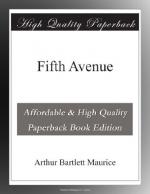Some Avenue Clubs in the Early Days—The
Invention of the Club—Cato or
Dr. Johnson?—The Judgment of Thackeray—The
Union—The Prolific
Diedrich Knickerbocker—Omens of 1836—The
Century—Its Descent from the
Sketch and the Column—Old-Time Austerity—Leaders
of the Talk—The
Lotos—The Union League—The Manhattan—The
First of the College
Clubs—The Columbia Yacht—The
New York Athletic—Rise and Fall of the
Traveller’s—The Arcadian.
“Presuming that my dear Bobby would scarcely consider himself to be an accomplished man about town until he had obtained an entrance into a respectable club, I am happy to inform you that you are this day elected a member of the ‘Polyanthus,’ having been proposed by my friend, Lord Viscount Colchicum, and seconded by your affectionate uncle. I have settled with Mr. Stiff, the worthy secretary, the preliminary pecuniary arrangements regarding the entrance fee and the first annual subscription—the ensuing payments I shall leave to my worthy nephew. You were elected, sir, with but two black-balls; and every other man who was put up for ballot had four, with the exception of Tom Harico, who had more black balls than white. Do not, however, be puffed up by this victory, and fancy yourself more popular than other men. Indeed, I don’t mind telling you (but of course I do not wish it to go any farther) that Captain Slyboots and I, having suspicions of the meeting, popped a couple of adverse balls into the other candidates’ boxes; so that, at least, you should, in case of mishap, not be unaccompanied in ill-fortune.”—Thackeray’s “Mr. Brown the Elder takes Mr. Brown the Younger to a Club.”
Very likely there are a few thousand New Yorkers, who like the present writer, not having considered the subject very deeply, have held to the vague idea that the club was an invention of a certain Dr. Samuel Johnson. Also that it came about in some such way as this. The Doctor had grown weary of bullying the patient Boswell, and browbeating the acquaintance met by chance in Fleet Street or the Strand did not entirely satisfy him. So one day, storming out of the Cheshire Cheese, after roundly abusing the larkpie of which he had consumed an enormous quantity, he founded the first club, with the object of gathering together a number of his fellow-mortals in one place, and upon them pouring out the vials of his pompous and splenetic wrath.
One day, however, the “De Senectute” that had been long forgotten was recalled by a passage in Mr. James W. Alexander’s “History of the University Club of New York.” There it was pointed out, that as far back as 200 B.C., Cicero represented Cato as saying: “To begin with, I have always remained a member of a ‘Club.’ Clubs, as you know, were established in my quaestorship on the reception of the Magna Mater from Ida. So I used to dine at their feast with members of my club—on the whole with moderation.” But, except as a point of historical interest, whether stern Cato or voluble Johnson was the inventor does not matter greatly to the New York club member who is airing his weekly grievance by drawing up a petition, or writing a scorching letter a day to the House Committee.




